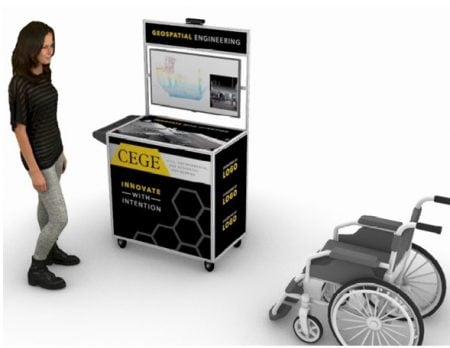The Department of Civil, Environmental, and Geospatial Engineering is seeking corporate sponsors for three Mobile Displays. The purpose of the Mobile Displays is to provide opportunities for prospective students, K-12 students, families, friends, and visitors to campus to experience civil, environmental, and geospatial engineering.
The Mobile Displays will be in prominent locations throughout Dillman Hall and Dow Engineering and Experimental Sciences Building so that prospective students on a campus tour can learn about our programs through hands-on activities and connections to real-world engineering. Being mobile, the displays will be used during K-12 Outreach events, Career Fairs at area schools, and travel with our Geospatial Engineering Trailer, which supports K-12 outreach to students in Michigan and beyond. Of course, the Mobile Displays will be deployed in our own classrooms as demonstrations faculty use to emphasize key principles to future engineers. Each Mobile Display is based on a key principle essential to the discipline and the degree program.
The key principle demonstrated in the Civil Engineering Mobile display is stress. Stress is the result of when a force like tension or compression acts on a material or body. Stress is measured as a ratio of force over area (e.g., lb/in2, N/m2). The higher the force, the higher the stress—or the smaller the area the higher the stress. All materials have a “stress limit” that, if reached, will fail said material or body. Stress on a bridge beam being “loaded” by moving traffic can be controlled by changing the area moment of inertia, I, which is defined by the geometrical cross-section of the beam. The higher the moment of inertia the less stress a beam will experience. The beauty of the engineering design process in this simple case is best explained by considering that a pipe (which is hollow) will have a bigger area moment of inertia than a rod (which is solid) using the same amount of material. This Engineering Mobile Display demonstrates how a specific load (or a specific deflection) can affect the stress on a beam based on its cross-sectional shape. The many “mini beams” represent real-world structural sections currently used by industry. Students and visitors can see the interaction of loads, deflections, stresses, materials, shapes, and even failures with hands-on “interplay” and real-time calculations. The almost seemingly rudimentary principles of the ancient tried-and-true engineering process is easily explained and is sure to capture the interest, and spark curiosity, in all folks that stop by to play with us.
Concentration is the key principle demonstrated through the Environmental Engineering Mobile Display. Using their own breath, students can see the impact of the amount of CO2 they release when they breathe in their environment. Those CO2 concentrations are then connected to current and past atmospheric CO2 concentration data. Concentration is a fundamental way in which we express the amount of substances in our water, air and soil environments. Helping our students experience firsthand the concept of concentration can draw them into the field.
Location is the fundamental principle demonstration in the Geospatial Engineering Mobile Display. Location is the basis of positioning, where a person, place or thing is identified in three-dimensional space. We all occupy space and location is where we are at any given point in time. This location can be quantified by measurements that ultimately identify position. Geospatial Engineers use a multitude of tools that include electronic total stations, 3D scanners, UAV’s, and GPS to precisely and accurately measure position to determine location. Look around you. There is literally nothing that has been constructed, placed, erected, or removed without first knowing its location. Location is where we are and will always be. Designed with sustainability and accessibility for all in mind, the Mobile Displays are easily transportable and easy for children of all ages to explore. Sponsorships are available for each Mobile Display. To become a CEGE Mobile Display sponsor, please contact Audra Morse at anmorse@mtu.edu or 906-487-3240.
